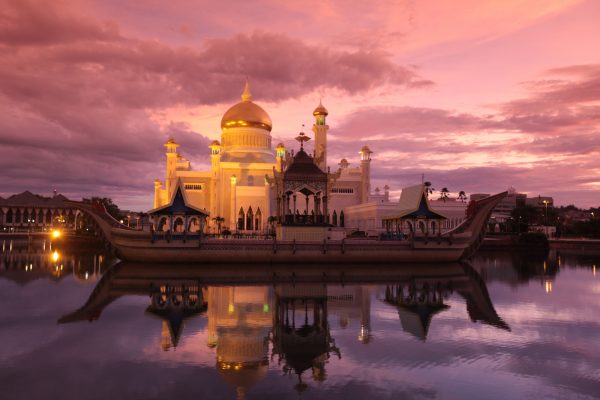When the world thinks of oil-rich monarchies, names like Saudi Arabia and the UAE often come to mind—states that have mastered the art of buying public compliance with extraordinary wealth. Brunei, a tiny nation on the island of Borneo, rarely enters this conversation. Yet, this absolute monarchy, ruled by Sultan Hassanal Bolkiah, stands as one of the most repressive regimes in Southeast Asia.
Unlike Dubai’s glittering skyline or Riyadh’s geopolitical ambitions, Brunei operates under a shroud of obscurity. Its human rights record is abysmal, its citizens are muted, and its ruler enjoys an obscene lifestyle that contrasts starkly with the small, controlled existence of his subjects.
A Sultanate of Contradictions
Sultan Hassanal Bolkiah, one of the richest men in the world, governs Brunei as his personal fiefdom. With a net worth estimated at $28 billion, the Sultan lives a life of excess. His sprawling palace, Istana Nurul Iman, is the largest residential palace in the world, boasting 1,788 rooms, a private zoo, and a fleet of luxury cars that could rival the GDP of small nations.
But unlike the Gulf States, where such wealth is at least partially shared with citizens through generous welfare systems and glittering infrastructure, Brunei offers little in return. While its citizens enjoy free education, healthcare, and fuel subsidies, the country lacks the lavish opportunities or freedoms that might justify such inequality.
For the average Bruneian, life is less about thriving and more about enduring. The economy is stagnant, heavily reliant on dwindling oil and gas reserves, and offers few opportunities for growth. Critics argue that the Sultan’s extravagance is a bitter insult in a country where the government suppresses dissent and leaves the population economically inert.
Crushing Human Rights Under the Gilded Throne
Brunei’s authoritarian regime enforces strict control over every aspect of its citizens’ lives. The introduction of Sharia law in 2014 marked a chilling escalation in its repression. Under these laws, homosexuality is punishable by death by stoning (link), though international backlash has led to a de facto moratorium on executions.
Freedom of expression is virtually non-existent. Brunei ranks 142nd out of 180 countries on the 2023 Press Freedom Index, placing it below countries like Turkey and Venezuela. Independent journalism is impossible, and even mild criticism of the Sultan can result in imprisonment.
Official statistics on political prisoners are hard to come by, but anecdotal evidence suggests that dissenters are swiftly silenced. Brunei’s Internal Security Act, reminiscent of colonial-era laws, allows for indefinite detention without trial. The combination of strict surveillance, a controlled media, and draconian punishments ensures that few dare to speak out.
Click the link to read about Tonga.
A Passive Population
What’s perhaps most striking about Brunei is the apparent lack of visible resistance. Unlike the protests that have erupted in places like Iran or Hong Kong, Brunei’s population appears content—or at least resigned. Critics argue this is a reflection of the state’s pervasive control and a culture that discourages confrontation.
Brunei’s modest population of approximately 450,000 lives under a regime that provides basic necessities but stifles ambition and freedom. While the Sultan flaunts his wealth, ordinary Bruneians live in a country devoid of cultural vibrancy or meaningful opportunities.
This passivity, however, should not be mistaken for loyalty. Beneath the surface, dissatisfaction simmers. A generation of young Bruneians, connected to the outside world through social media, is increasingly aware of what they are missing. The Sultan’s lavish lifestyle is harder to justify in an era when inequality is globally scrutinized.
A Spark Could Ignite Change
Brunei’s relative obscurity on the global stage has shielded it from the kind of international criticism that might catalyze reform. Yet, the conditions for upheaval are all present. An economically stagnant population, a repressive regime, and a visible symbol of inequality in the Sultan’s wealth create a powder keg that requires only a spark.
The Sultanate’s reliance on oil and gas, which accounts for over 90% of government revenue, is unsustainable. As reserves dwindle and global demand for fossil fuels decreases, Brunei’s economic model will collapse. Without significant reform, this could push its passive populace toward active dissent.
Historically, authoritarian regimes crumble not when they are at their most repressive, but when their economic or ideological justifications fail. For Brunei, the combination of growing economic uncertainty and generational discontent may prove fatal to the Sultan’s reign
A Country at a Crossroads
Brunei’s future hangs in the balance. The Sultan’s gilded rule, propped up by oil wealth and repression, cannot last forever. Whether change comes from within or is spurred by international pressure remains to be seen.
For now, Brunei is a dictatorship cloaked in obscurity. Its people are not starving, nor are they free. They live in a gilded cage, with just enough provided to keep them quiet. But history has shown that even the most complacent populations can rise when pushed too far.
Brunei may not yet be a nation on the brink, but it would take surprisingly little to sow the seeds of revolution. For a country so tightly controlled, the Sultan’s greatest weakness may lie in his own extravagant excesses.

